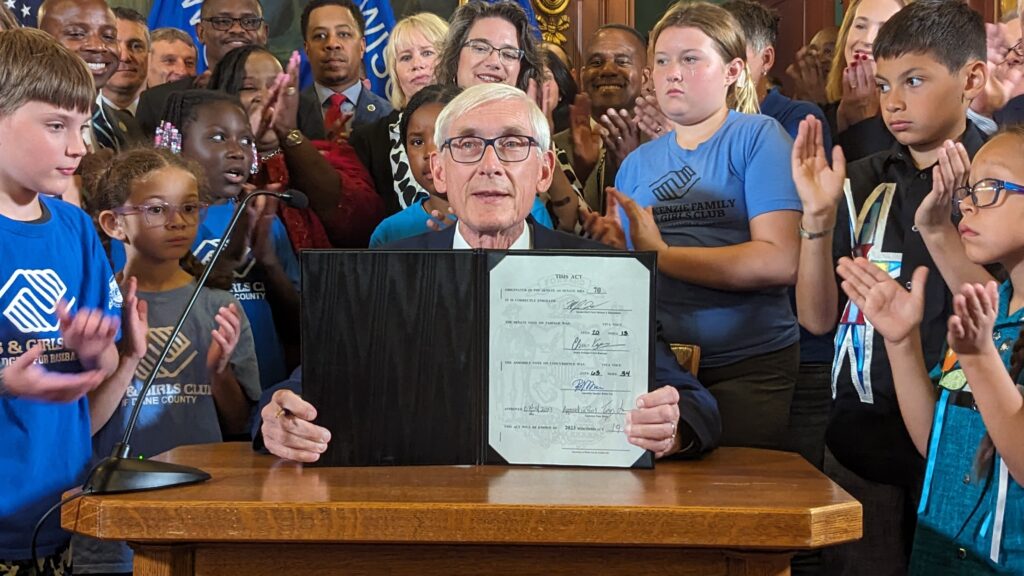Assembly Passes Constitutional Amendment To Limit Evers’ Veto Power
After school funding move, amendment would block Governor from increasing funding.

Gov. Tony Evers after signing the 2023-25 budget bill with 51 partial vetoes on July 5, 2023. (Baylor Spears | Wisconsin Examiner)
The Assembly passed a proposed constitutional amendment Tuesday that would bar the governor, in using the line-item veto, “from creating or increasing or authorizing the creation or increase of any tax or fee.”
The proposal — AJR 112 — is a reaction to Gov. Tony Evers’ veto last year that extended school funding increases for 400 years. The proposed amendment passed in a 64-35 vote.
Before signing Wisconsin’s biennial budget last year, Evers crossed out certain digits to extend an annual $325 per-pupil increase in revenue limits — the maximum amount of revenue schools may raise through state general aid and property taxes — through the year 2425.
Republicans criticized the action, saying Evers overstepped his power and had guaranteed that property taxpayers would pay higher property taxes for the years to come. Public school advocates, however, have said the bill would not automatically lead to higher property taxes since school districts would just have the option of increasing their levies.
Rep. Amanda Nedweski (R-Pleasant Prairie) said the proposal was not just about Evers, but was rather about ensuring that the Legislature is the only branch making laws. Nedweski said she first learned about the partial veto power in middle school when former Gov. Tommy Thompson used the “Vanna White” veto.
“Tommy Thompson’s use of the partial veto to override the idea and intent of the legislature in the law was considered egregious by the opposition and brilliant by his supporters,” Nedweski said. “I, myself, remember thinking it didn’t seem right. It seemed to me that the partial veto flat-out broke the rules.”
Wisconsin has one of the most powerful partial veto powers for its executive in the country, but it has been limited several times across history. The ability to exercise the “Vanna White” veto — or eliminating single letters within words — was barred in 1990 by a constitutional amendment.
Another constitutional amendment passed in 2008 eliminated the “Frankenstein veto” — or the ability for governors to create new sentences by combining parts of two or more sentences. In 2020, a decision by the Wisconsin Supreme Court, which ruled three of Evers’ partial vetoes unconstitutional, further limited the power. There still is no consensus about the extent of the power.
Nedweski said Democrats should support the proposal because Wisconsin will have a Republican again at some point.
“The people of Wisconsin deserve transparency and integrity from the office of the executive,” Nedweski said. “They should not be subjected to political trickery.
As a constitutional amendment, the new proposal will need to pass in the Legislature in two consecutive legislative sessions and be approved by voters in order to become law.
The proposal will now go to the Senate.
Assembly passes constitutional amendment to limit partial veto power was originally published by Wisconsin Examiner.





















